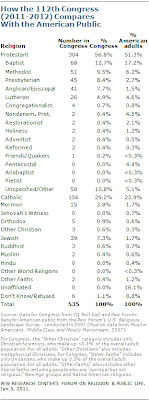Religion and the New Congress

Chris Beneke
The Pew Forum's religious survey of the 112th Congress (table on the right is theirs) is out. No surprise that Protestants and Catholics abound, though roughly in line with their proportion of the overall population. Perhaps also unsurprising to historians will be the fact that 69% of Congressional Republicans identify as Protestant, while 34% of Congressional Democrats identify as Catholic and 15% as Jewish. Pew also reports:
A few of the country’s smaller religious groups, including Episcopalians, Presbyterians and Jews, have greater numerical representation in Congress than in the general population. Some others, including Buddhists and Muslims, are represented in Congress in roughly equal proportion to their numbers in the adult U.S. population. And some small religious groups, such as Hindus and Jehovah’s Witnesses, are not represented at all in Congress.Perhaps the greatest disparity between the religious makeup of Congress and the people it represents, however, is in the percentage of the unaffiliated – those who describe their religion as atheist, agnostic or “nothing in particular.” According to information gathered by CQ Roll Call and the Pew Forum, no members of Congress say they are unaffiliated. By contrast, about one-sixth of U.S. adults (16%) are not affiliated with any particular faith. Only six members of the 112th Congress (about 1%) do not specify a religious affiliation, which is similar to the percentage of the public that says they don’t know or refuses to specify their faith.
The apparent non-electability of the unaffiliated might prompt us to again ask what exactly "unaffiliated" means. It may not be the same thing as agnosticism or atheism (a 2006 Baylor survey in fact indicated that a healthy majority of the un-affiliated "believe in God or some higher power") though it might be fairly close (Pew itself concluded that "the majority of the unaffiliated population ... is made up of people who simply describe their religion as 'nothing in particular.'") If we were examining these numbers the way early American historians and journalists study the founders, we might also wonder about the percentage of deists residing among both the non-affiliated and the affiliated.
As the Pew report notes, the change from the 111th Congress is very modest. However, the change from the 87th (1961-62) Congress is significant with Catholics (who have gone from 19 to 29% of the total) and Jews (who have gone from 2 to 7% of the total) now serving in noticeably larger numbers. I'm looking forward to Kevin Schultz's forthcoming Tri-Faith America: How Catholics and Jews Held America to Its Protestant Promise (Oxford UP, due in March) to help us shed some light on all of this.

Comments
I too am looking forward to the arrival of Kevin Schultz's TRI-FAITH AMERICA! And yes, the appearance and effects of bizarre things like "America's religious triangle" is a major theme.
Thanks for the shill. You must have heard I taught BEYOND TOLERATION in a recent graduate seminar (yes, it was loved, but more importantly, they were new copies, all of 'em).
Thanks,
Kevin
http://www.firstthings.com/article/2011/01/the-good-news-about-evangelicalism
The Baylor Religious Survey took pains to find these nondenominational church attenders by asking them to identify themselves not only by their religious family and denomination but also by their local congregation. The researchers found: 1) that Americans remain connected to congregations, but less so to denominations or more generic religious identities; 2) that the unaffiliated are currently 10.8 percent of the population rather than the 14 percent or 16 percent claimed by other surveys; 3) that many of those typically identified as “unaffiliated” are not only affiliated with congregations but also attend evangelical churches; and 4) that America is considerably more evangelical than prior studies have found. Fully one-third of Americans (approximately 100 million) affiliate with an evangelical Protestant congregation. Indeed, evangelicals remain the numerically dominant religious tradition in the United States.
Witneses site John 17:16 where Jesus said his kingdom was "no part of the world," in staying out of politics. That is why they are not represented in Congress.
http://www.knocking.org